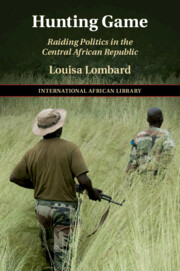Book contents
- Hunting Game
- The International African Library
- Hunting Game
- Copyright page
- Contents
- Figures
- Maps
- Acknowledgements
- Abbreviations and acronyms
- Map
- 1 Force, status, and uncertainty in the arts of acquisition
- 2 Zariba contests and collaborations
- 3 Manhunts persist in an unfortunate colony
- 4 Big-game hunting and regulatory sociality
- 5 The limits of law in coercive conservation
- 6 Camouflage skills
- 7 Denunciation and liberty
- 8 Force and status in rebellion
- 9 Sovereignty and distribution amid forceful acquisition
- References
- Index
- Titles in the series
5 - The limits of law in coercive conservation
Published online by Cambridge University Press: 20 April 2020
- Hunting Game
- The International African Library
- Hunting Game
- Copyright page
- Contents
- Figures
- Maps
- Acknowledgements
- Abbreviations and acronyms
- Map
- 1 Force, status, and uncertainty in the arts of acquisition
- 2 Zariba contests and collaborations
- 3 Manhunts persist in an unfortunate colony
- 4 Big-game hunting and regulatory sociality
- 5 The limits of law in coercive conservation
- 6 Camouflage skills
- 7 Denunciation and liberty
- 8 Force and status in rebellion
- 9 Sovereignty and distribution amid forceful acquisition
- References
- Index
- Titles in the series
Summary
In the wake of ramped-up forceful acquisition in CAR’s vast parklands in the 1970s and 1980s, the conservation agenda that had been a minor part of the big-game hunting system also became more forceful. By the late 1980s, a European Union-funded conservation project had been deployed, including a militia of some hundred men whose job it was to patrol the parklands and apprehend anyone they found. Although they were supposed to kill or injure only when necessary for their self-defence, they were able to exercise considerable latitude in their determination. The second half of the book focuses on the transformations wrought by entanglements around forceful conservation. Rather than using this as a case of coercive, even militarised, conservation among other cases of militarised conservation, these chapters use conservation as a way to explore the interpersonal repertoires developed in situations where neither law nor identity is much of a guide. The simultaneous over-presence and powerlessness of law is due in part to the fact that so much of daily life and practice in the region is illegalised. When life is illegal all the way down, camouflage and denunciation are two main modes of action, and each forms the heart of a subsequent chapter.
- Type
- Chapter
- Information
- Hunting GameRaiding Politics in the Central African Republic, pp. 115 - 145Publisher: Cambridge University PressPrint publication year: 2020



